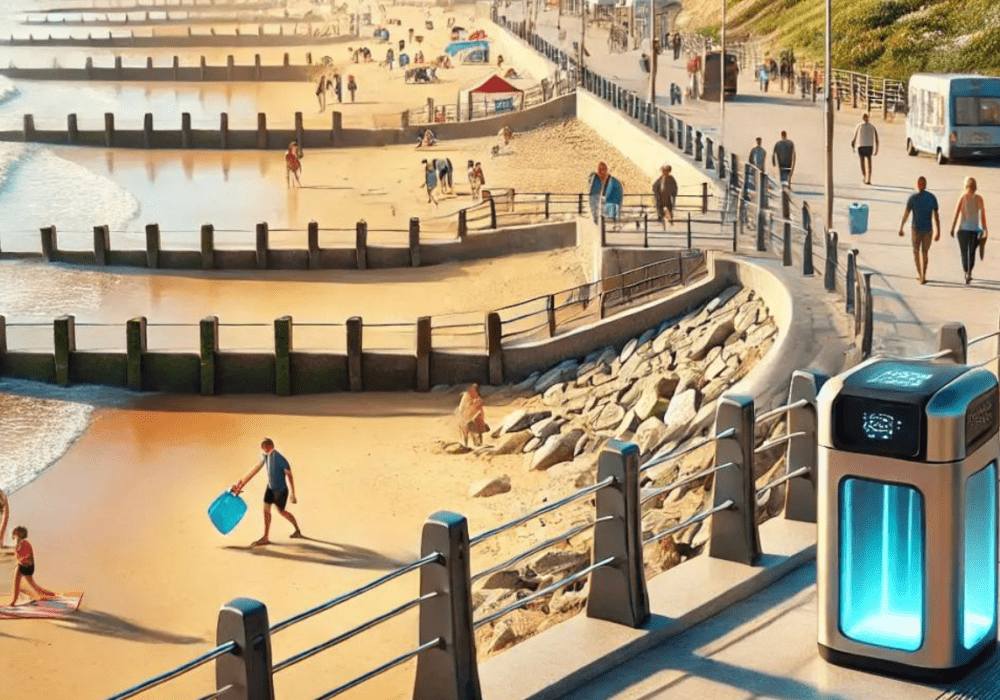
Seasonal summer boom for some local communities
According to Worldometers.info elaboration of the latest United Nations data, the UK’s population has increased by some 5.2 million since the Conservative-led coalition government came to power in 2010.
The UK has also long been a destination for overseas visitors during summer months. Recent years have seen the trend for ‘staycations’, as UK residents opt to avoid the extra cost and fuss of foreign travel by holidaying in the UK rather than abroad.
The upsides of this increase in population and in UK leisure activity can be highly beneficial. Tourism is a major contributor, boosting the UK economy, generating jobs in hospitality, retail, transportation, and leisure activities. Peak seasons at places like seaside resorts and coastal areas, festivals, parks and leisure facilities lead to a surge in visitor spending, benefiting local businesses and boosting employment rates.
Preparation for seasonal peaks often includes infrastructure investment such as creating better transport links, upgrading facilities, and public space improvements. It often creates opportunities for cultural and historical projects, enhancing the overall appeal of destinations.
Communities can be revitalised, and towns regenerated by the influx of visitors, breathing new life and energy into resorts and destinations. Events like festivals bring performers, artists, and vendors, creating a vibrant atmosphere and allow local culture to come to the fore. Word gets around quickly; putting places on the map has a tendency to attract even more footfall.
Success produces some negative impacts
However, on the downside, prosperous seasonal activity often produces some problematic impacts. Peak seasons and popular events can lead to overcrowding in resorts and tourist hotspots, creating long queues and generally increasing demand on local resources. Out of season, it is also likely to mean lean times for many when the local economy is driven by tourism.
Large visitor numbers may strain infrastructure, leading to traffic congestion, and putting pressure on accommodation and sanitation facilities. Local communities may experience displacement through being priced out by rising housing costs. One trend that has fuelled this is the purchase of second homes for intermittent use by wealthy visitors, and lettings via internet marketplaces.
There is, of course, likely to be an environmental impact. Increased transportation, energy consumption, and waste generation associated with tourism contribute to sustainability issues. This can be seen at some of the most iconic destinations across the world. It’s not just areas of natural beauty – natural habitats can be anywhere – and often equate to fragile ecosystems that could be damaged as a result of tourism and leisure activity.
Overflowing waste bins during seasonal peaks
Naturally, seasonal peaks generate a surge in waste, and one of the most frequently seen symptoms of seasonal spikes in visitor numbers is overflowing waste bins. Food packaging is the major component, with takeaway boxes, disposable utensils, plastic and glass bottles and cans, often single-use items, all contributing significantly to the mountain of waste.
Visitor behaviour can also be a big problem; thoughtless littering by discarding items inappropriately in random places is one thing; overflowing bins leading to people discarding items close by is another. In both of these cases waste food attracts and helps the rodent population to thrive during warm weather.
One response is to increase the frequency of waste management collection rounds. However, such an approach is haphazard and inefficient. Scheduling extra rounds where only some bins require servicing does not optimise fossil fuel or EV energy consumption, or make effective use of the working hours for waste management operations.
Targeting waste bins that need emptying
Whitespace’s innovative bin sensors show the level of waste in containers, identify their location, ambient temperature, and allow for collection rounds to be appropriately scheduled.
Using compact Internet of Things (IoT) technology, our smart bin solution sensors are easily concealed within each bin and utilise high reliability optical, geolocation and thermistor technologies to identify collection needs reliably and accurately.
Using reliable mobile SIM technology to transmit real-time data, bin information is collected from the sensors and used within our municipal waste management software to efficiently schedule collection activity. Once waste reaches a predetermined level, a collection request is automatically raised for cleansing teams within Whitespace’s job management software.
A bin could be added to an existing round, or a new collection round could be scheduled to specifically target bins that need emptying. This reduces unnecessary collections, minimises environmental impacts, and achieves significant cost savings through optimising energy usage and the use of workers’ time.
Targeting bins that require emptying with Whitespace’s smart bin solution prevents overflowing bins, and is ideal for allowing local authorities and their waste management partners to keep locations that experience spikes in activity as attractive as possible.
Prevent overflowing bins with Whitespace
Climate science analysis suggests that a seasonal shift is occurring. 2023 and 2024 have provided indications that winters are warmer, with the barrier between spring and summer becoming less defined.
In the face of this variability, it is difficult to predict when bins need emptying using historical data. Ultimately, direct monitoring of bins in real-time is the most reliable and efficient way to respond to managing waste effectively in public spaces.
Whitespace partners with over 100 local authorities to help deliver efficient high quality environmental services. To find out more about Whitespace Municipal Waste Management solutions, please get in touch by calling us on +44 (0)1483 231 650 or emailing us at info@whitespacews.com
